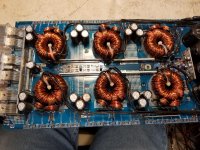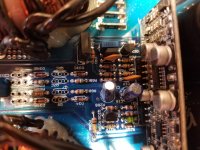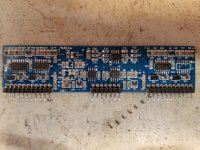Hi, working on a DC Audio 9.0K. Same as the Ampere audio and several others. Easy question so far. The power supply driver transisters, KTA1275 and KTC3228s, have a diode that has shorted. Is this just a signal diode like 1N4148? If not, anybody know the number? Thanks.
Attachments
D34B and C appear to be marked. Pull them to see if you can read the numbers.
If the anode is connected to ground, it may be a 9.1 or a 10v Zener.
Someone else may have a more definitive answer.
If the anode is connected to ground, it may be a 9.1 or a 10v Zener.
Someone else may have a more definitive answer.
Perry, couple of questions on this type of amp. I downloaded your diagram of how to test the output driver chips. The IR21844s. If it checks okay according to your diagram, is the chip then good? I caused one of the outputs to blow. I checked the IC and replaced the output. Powered it up and one of the 12 regulators blew. All the output check good and all the driver chips check good. Is there another reason the 12V regulator would blow. It has two in parallel. only one blew.
The diagram isn't definitive but can give you a fair idea of the condition of the IC. The 3 terminals of each section (high and low), are very similar to a drive circuit for a power supply. When the IC is damaged, the output of either section can short to either the positive or negative supply terminal for that section and, in some instances, the power supply terminals will short together. That's what those tests show.
If an IC fails due to failing output FETs, it's often due to the FET shorting to the rail voltage and that gets driven back to the IC. When that happens. the driver IC can short internally and drive high voltage back into the regulators. This will generally cause the regulator to fail immediately but can also just injure it to make it fail shortly after the amp is powered up for testing.
If an IC fails due to failing output FETs, it's often due to the FET shorting to the rail voltage and that gets driven back to the IC. When that happens. the driver IC can short internally and drive high voltage back into the regulators. This will generally cause the regulator to fail immediately but can also just injure it to make it fail shortly after the amp is powered up for testing.
New day. New problem. Trying to repair my goof up. Got all the outputs out of the amp. Rebuilt the driver board. Just went ahead and replaced the TLO72, LM211, LM393 and all four Driver chips. Installed the board. I have a good input signal on pin one of U2 and U7. On the input pins of U1 and U5 I'm getting -144 volts. All the transistors and diodes on the board check good. Anyone have experience on this board that can point me in the right direction? I assume U3, 4 and 6 are good since I have a good input signal on U7 & 2.
Attachments
Last edited:
For the ICs like the 21844, they are referenced to the negative rail. The black meter probe (not the scope ground, if it's a mains powered scope) will have to be on the negative rail to measure the various voltages. The high-side drive section is an exception and testing requires a different technique.
What is the DC voltage on the input of U1 and U5 measuring that way.
What is the DC voltage on the input of U1 and U5 measuring that way.
Good input signal on the input side of R42. -150 volts on the output side to the emiter of Q9. Good ground on the base and -145 volts on the collector. No Driver IC on the board.
Referenced to the negative rail I have 5.6 volts on the input of U1 & U5. On the input of U7 & U2 I have 145 volts.
U7 is out of the circuit. I pulled all the driver chips. I know in the pic I sent it showed the drivers on the board. I sent that pic just as a reference to the board I'm working on. Do you still want the voltages?
Changed Q9 & Q7. Found two Resistors bad. 2.4K ohm. I don't have those. I have 2K ohm. Do you think they will work in this circuit. Or should I order them?
I'd order them and use the right parts but for TESTING, the 2k may be OK.
Are the ICs still out of the board?
Are the ICs still out of the board?
- Home
- General Interest
- Car Audio
- DC Audio 9.0K


